The Kyoto Zen Feast invites visitors to step into a realm of tranquility and mindfulness, where the simple act of eating becomes a profound meditation. Nestled within the serene confines of Butsugenji Temple, participants embark on a sensory journey, savoring each bite of pickled vegetables and rice balls as they cultivate gratitude and presence. This immersive experience culminates in the gentle guidance of a resident monk, as attendees express their newfound state of awareness through the flowing strokes of a calligraphic brush, creating their own unique interpretations of the Buddha. The encounter promises to leave a lasting impression, inspiring a deeper appreciation for the beauty that arises when one fully embraces the present moment.
Key Points
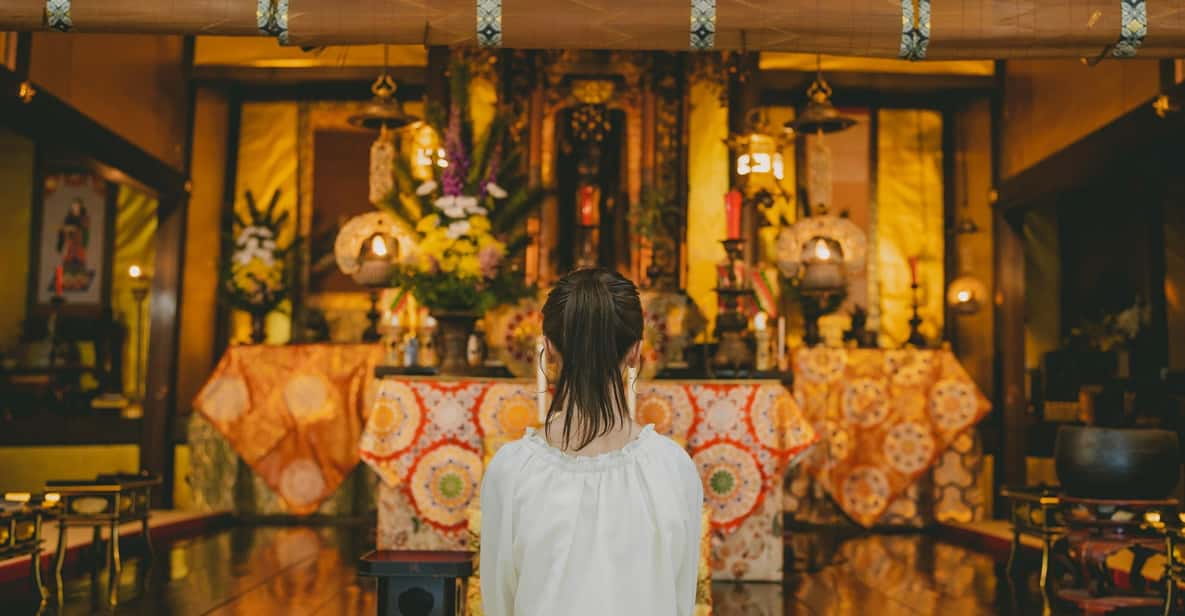
- The Kyoto Zen Feast offers a holistic experience blending meditation, mindful eating, and Buddha drawing in the serene setting of Butsugenji Temple.
- Participants engage in standing meditation, seated zazen, and chanting sutras, fostering a shared sense of community and connection.
- The mindful eating experience encourages heightened sensory awareness and appreciation for the act of consumption.
- The guided Buddha drawing activity promotes mindfulness and self-expression, culminating in the sharing of artwork.
- The retreat experience embraces the principles of Zen, including the recognition of impermanence and the interconnectedness of all things.
Meditation and Chanting Practices
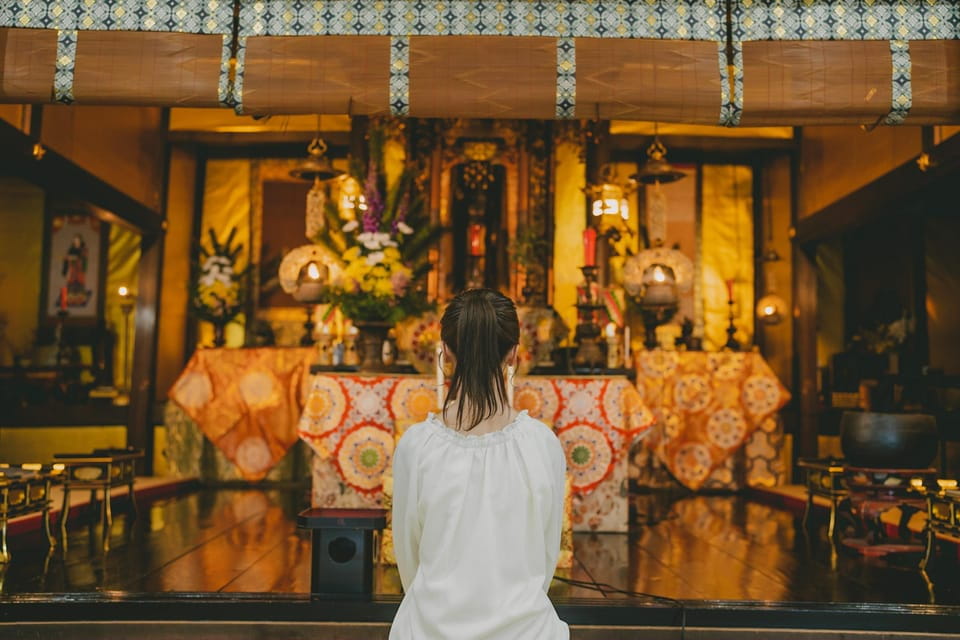
The Kyoto Zen Feast begins with a series of meditative practices led by the temple’s monk.
Participants engage in standing meditation, focusing on their breath and posture.
Transitioning to seated zazen, they quiet their minds, allowing thoughts to arise and pass without attachment.
The group then joins the monk in chanting sutras, their voices blending harmoniously.
Those who wish to participate are welcomed, creating a shared sense of community.
This integration of meditation and chanting sets the stage for the next phase of the experience – the eating meditation.
You can also read our reviews of more tours and experiences in Kyoto.
Mindful Eating Experience
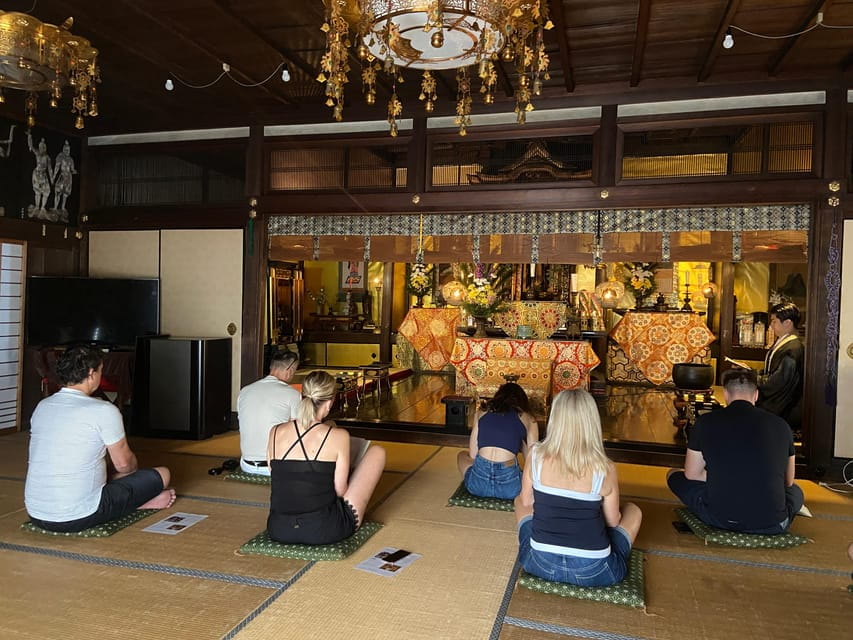
As participants transition from the meditative practices, they’re invited to engage in a mindful eating experience.
The monk presents delicate, pickled Japanese vegetables and rice balls, encouraging guests to savor each bite with heightened senses.
This eating meditation prompts participants to:
- Notice the flavors, textures, and aromas of the food.
- Chew slowly, attuned to the act of nourishing the body.
- Reflect on the connection between the self and the sustenance.
Through this mindful eating, guests cultivate a profound appreciation for the simple act of consuming food, infusing the experience with a sense of gratitude and presence.
Buddha Drawing Activity
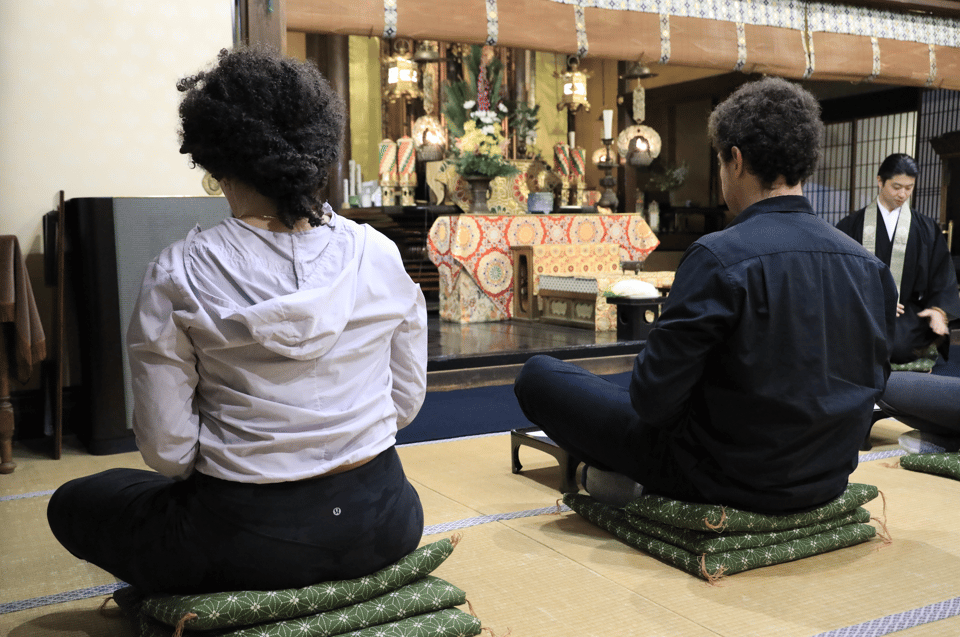
After savoring the mindful eating experience, participants now shift their focus to the serene Buddha drawing activity.
They’re provided with brushes, ink, and the finest washi paper, crafted by local artisans. A sense of tranquility fills the air as everyone begins to paint.
Guided by the monk’s gentle instructions, the participants channel their inner focus, allowing the brush to flow effortlessly across the paper. Each stroke is deliberate, embodying the principles of Zen.
As the Buddha shapes emerge, a profound sense of connection to the divine and the present moment arises. The activity culminates in sharing the personal artwork, fostering a deeper appreciation for the art of mindfulness.
Monk-Led Temple Experience
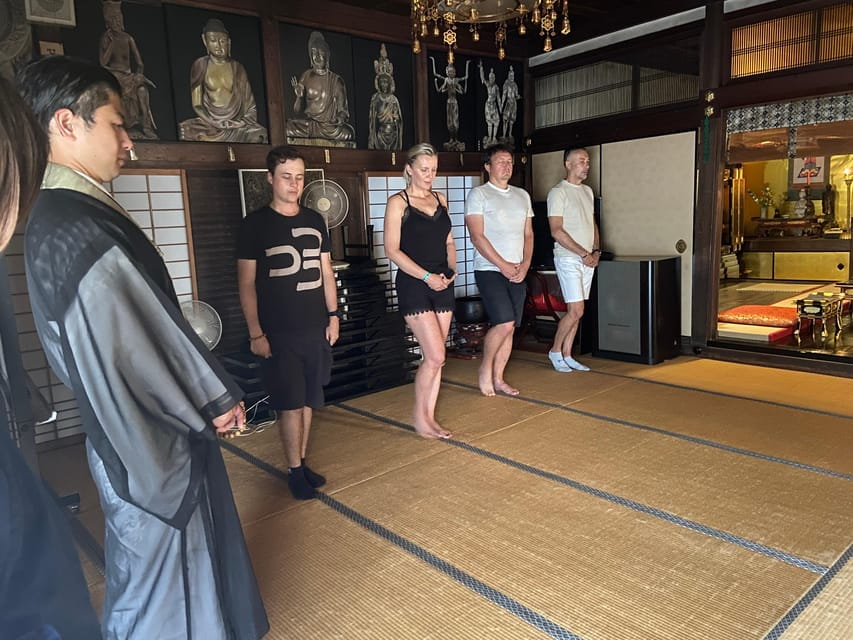
Participants enter the hallowed halls of Butsugenji Temple, a serene sanctuary nestled in Kyoto’s Rokkaku-dori area.
They’re greeted by the warmth and wisdom of Mr. Aburakoji, a monk dedicated to modernizing temple experiences. Under his guidance, the group embarks on a journey of mindfulness:
- Engaging in standing meditation, connecting with the present moment.
- Chanting sutras, their voices joining in harmonious resonance.
- Savoring a Zen feast of Japanese pickled vegetables and rice balls, each bite infused with intentionality.
Throughout the experience, the monk’s insightful commentary on the concept of Shogyomujo, or impermanence, invites participants to cultivate a deep appreciation for the fleeting yet profound nature of their surroundings.
Tranquil Retreat in Kyoto
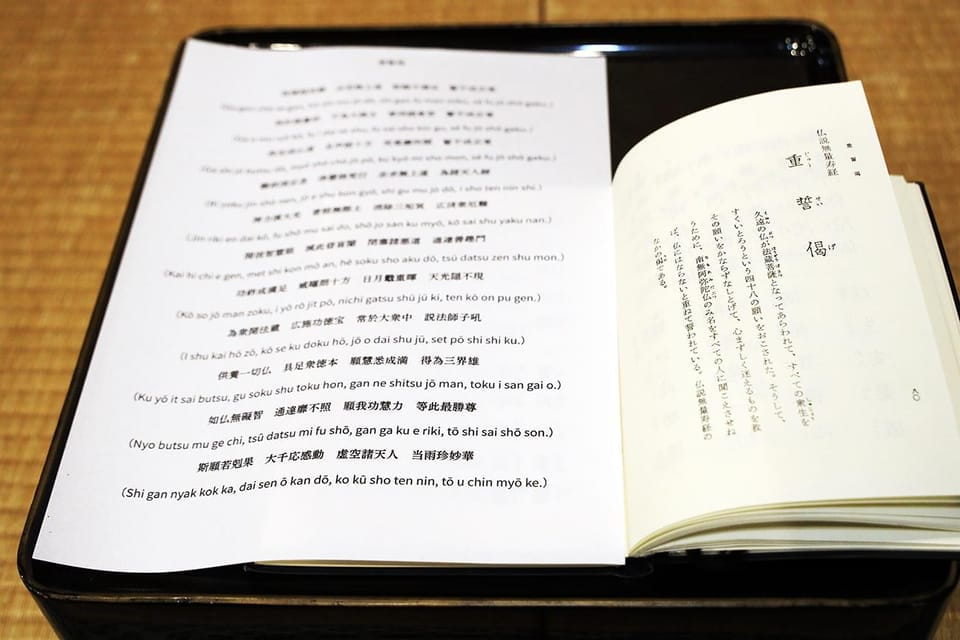
The Butsugenji Temple stands as a tranquil oasis within the bustling city of Kyoto, its serene presence offering a welcome respite from the outside world. Nestled in the Rokkaku-dori area, the temple’s striking architecture and lush gardens beckon visitors to slow down and enjoy the Zen experience.
| Mindful Practices | Architectural Features |
|---|---|
| Standing Meditation | Wooden Beams |
| Zazen (Seated Meditation) | Tranquil Koi Pond |
| Eating Meditation | Elegant Sliding Doors |
This intimate retreat allows guests to escape the chaos of daily life, connecting with the impermanence of the present moment through ancient traditions and contemplative rituals. Here, the mind finds solace, and the spirit is rejuvenated.
Impermanence and Mindfulness
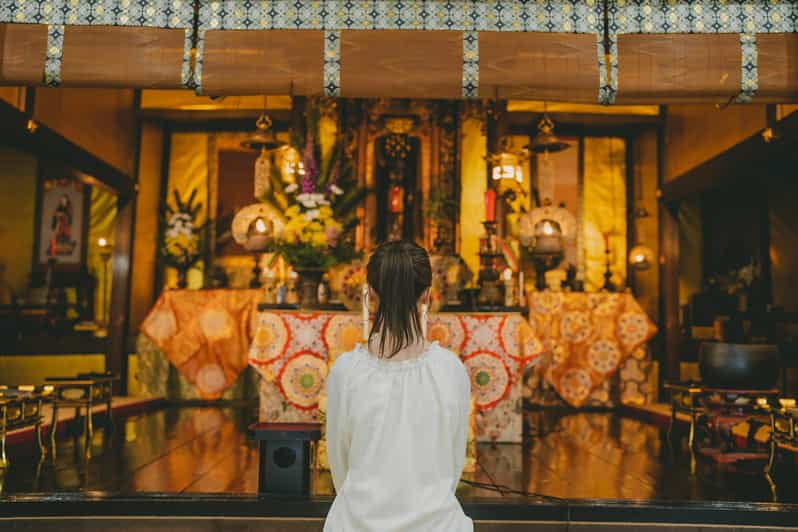
Embracing the ephemeral nature of existence, participants engage in a series of mindfulness practices that cultivate a profound awareness of the present moment.
Through standing meditation, zazen, and eating meditation, they connect with the impermanence at the heart of the Zen tradition.
This immersive experience invites them to:
- Observe the fleeting nature of thoughts and sensations.
- Cultivate a deep appreciation for the simplicity of each moment.
- Recognize the interconnectedness of all things, as the line between self and other blurs.
The Kyoto Zen Feast encourages participants to move beyond the conceptual mind, allowing them to fully inhabit the here and now, and to savor the beauty of the transient.
Booking and Cancellation Policy
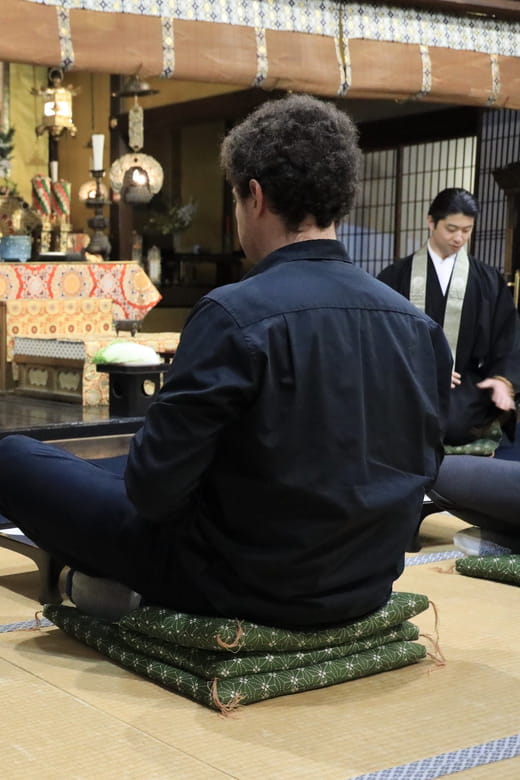
Customers can easily secure their spot for the Kyoto Zen Feast without any upfront payment. They’ll reserve now and pay later, giving them peace of mind in locking down their participation.
If plans change, no worries – free cancellation is available up to 24 hours in advance for a full refund. This flexible policy allows guests to experience the Kyoto Zen Feast with confidence, knowing they can get their money back if needed.
The activity’s limited group size of 10 participants ensures an intimate, tranquil atmosphere for this mindfulness journey.
With seamless booking and cancellation, guests can focus on being present and seeing the meditative practices.
Customer Reviews and Feedback
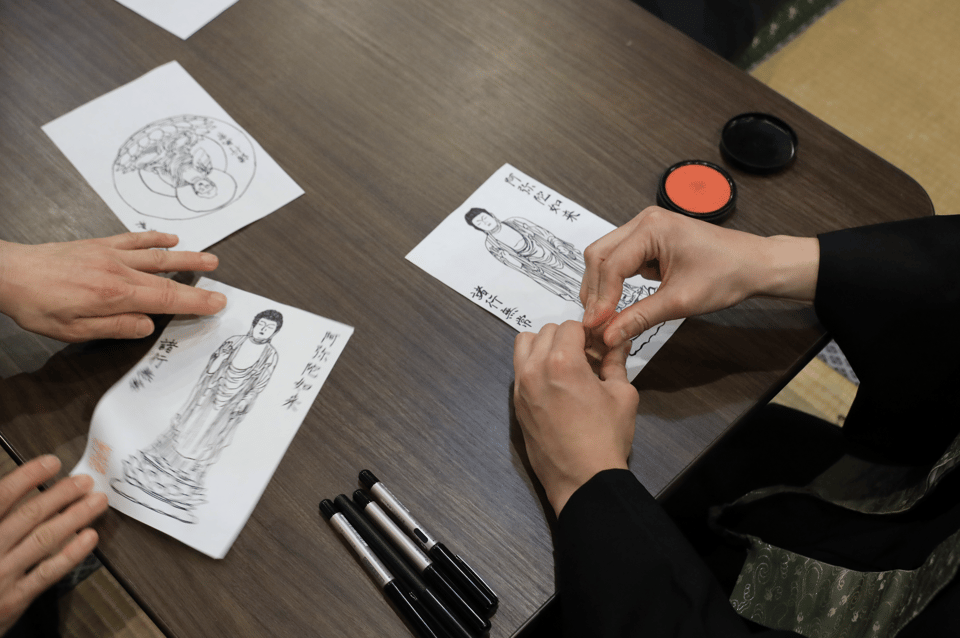
Participants have heartily embraced the Kyoto Zen Feast, awarding it an impressive 4.5-star rating based on two glowing reviews.
Attendees praised the monk’s friendly demeanor and insightful guidance, which enhanced the mindfulness experience. The activities were deemed refreshing and unique, particularly the eating meditation, which allowed participants to savor Japanese pickled vegetables and rice balls with intentionality.
The experience left a lasting impression, with one reviewer noting:
- "The Zen Feast was a deeply grounding and centering experience. I felt a renewed sense of presence and appreciation for the present moment."
- "Learning to draw a Buddha using brush and washi paper was a meditative act in itself. I’m thrilled to have this artwork as a memento."
- "The chanting of sutras, though optional, added a profound spiritual dimension to the gathering."
Frequently Asked Questions
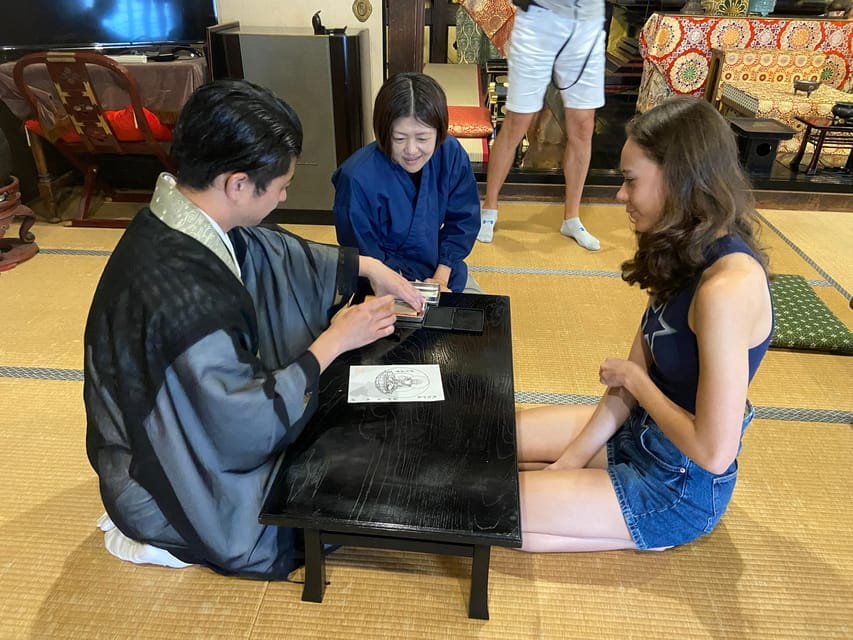
Is Photography Allowed During the Activities?
Photography is allowed during the activities, but participants are encouraged to remain present and mindful. The temple’s tranquil atmosphere invites visitors to fully enjoy the meditative practices and creative experience.
What Should Participants Wear to the Event?
Participants should wear comfortable, modest clothing that allows for easy movement during the meditation and drawing activities. Light, breathable fabrics are recommended to enhance the tranquil atmosphere and facilitate the mindful practices.
Are Vegetarian or Dietary Accommodations Available?
Yes, the event provides vegetarian options to accommodate dietary needs. Participants can enjoy the mindful eating experience with a selection of Japanese pickled vegetables and rice balls that cater to various preferences.
Can Participants Arrive Late or Leave Early?
Participants are encouraged to arrive on time and remain for the full 1.5-hour experience to fully enjoy the mindful practices. However, the temple staff understands unexpected circumstances and will accommodate late arrivals or early departures when possible.
Is There Any Age Restriction for Participants?
There’s no age restriction, as the experience aims to welcome all. Children are welcome, though the focus on mindfulness may be more suitable for older participants who can fully engage with the meditative practices.
Recap
The Kyoto Zen Feast invites participants to savor each moment, from the mindful consumption of traditional Japanese fare to the graceful expression of Buddha through brush and ink. This immersive experience cultivates a deeper appreciation for the fleeting beauty of the present, leaving attendees with a renewed sense of connection and tranquility amidst the timeless rhythms of the Butsugenji Temple.
More Tour Reviews in Kyoto
- Tour by Car With a Kyoto Native Away off Touristy|A Local Show You Secret Places
- Osaka or Kyoto Private Day Tour With English Driver Free Pickup
- Kyoto Millennium Shogun E-Bike Cycling Tour (East Course)
- Pedal Adventure Kyoto E-Bike Tour : True Kyoto Avoid the Crowds
- Authentic Kyoto Cuisine Tour With a Local Guide
- Private Guided Local Bar Crawl Experience in Kyoto
Not for you? Here's more things to do in Kyoto we have recnetly reviewed
- Tea Ceremony & Zen Meditation in Kyoto Samurai House(Mixed Group)
- Gion a Half Day Food Tour Designed for You With a Local Guide
- Matcha Making Experience in Kyoto
- F1 Japanese Grand Prix JR Chartered Train Departing From Kyoto
- Skip the Lines Basic Ticket at SAMURAI NINJA MUSEUM KYOTO
- Photo Shoot With a Private Vacation Photographer in KYOTO, JAPAN
- Kamo River’s Timeless Tales: A Self-Guided Audio Tour in Kyoto
- The Beauty of Kyoto – Historical Walking Tour of Higashiyama Area
- Japanese Cooking Class
- Arashiyama Bamboo & Must See Gardens With an Amazing Guide
- Kyoto-The City of the Dreams!
- Kyoto Custom Highlight: Private Walking Tour With Licensed Guide
